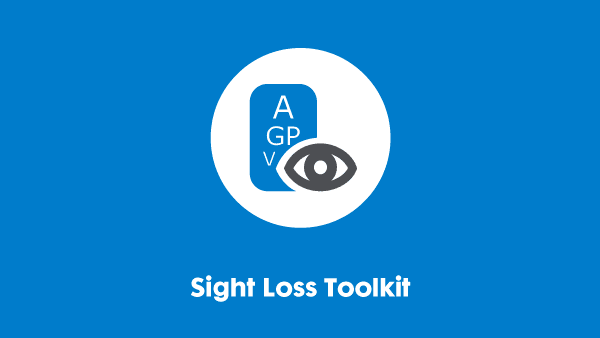Commissioned and funded by:
Last reviewed: November 2024
Access to Work
This is a UK Government scheme which aims to help people with disabilities get or remain in work. The support is based on individual needs.
You can find more information at our resource ‘Access to Work‘ and on the Government’s website.
Assistive technology
Specialist equipment used by people with sight loss to access print or digital information. For example, screen magnifiers and screen readers.
Blind/severely sight impaired
Severely sight impaired is the newer term for ‘blind’. This includes people with no sight and people with severely limited sight. It is diagnosed by an ophthalmologist and is dependent on meeting pre-set criteria.
Braille
A tactile system that uses raise dots to allow a person with sight loss to access written information. It is often seen in Braille books, and everyday packaging and signs. Not every person with sight loss uses Braille.
Certificate of Vision Impairment (CVI)
This form enables a person with sight loss to register with their local authority and access specific resources. It must be completed by a consultant ophthalmologist to confirm that a person is sight impaired (partially sighted) or severely sight impaired (blind).
Eye Clinic Liaison Officer (ECLO)
Specially trained staff who work in hospitals to provide practical and emotional support to people with sight loss and their loved ones.
Large print
Generally, large print is at least 16 to 18pt sized font. This is intended specifically for people who find it easier to read larger text.
Legally blind
This is when a person’s vision has met the criteria where they are eligible for a CVI.
Low vision
The RNIB defines this as when your vision is causing you difficulties with your day-to-day activities, despite having the best spectacles or contact lens correction.
Your vision does not need to meet the required level to be eligible for registration as sight impaired to be considered low vision.
Ophthalmologist
A specialist medical doctor who specialises in eye health. They can diagnose and treat a range of eye conditions including diseases and trauma by medication or surgery. They also liaise with other specialists to manage conditions that can affect the eye, such as multiple sclerosis, diabetes or arthritis.
They are usually based in hospitals.
Ophthalmology
This is the medical field which is concerned with diagnosing, and treating conditions affecting the eye and eye health.
Optician
An optician (also called a dispensing optician) is a professional with specific training. They are not medical doctors and cannot examine your eyes or treat eye conditions, but they can check prescriptions and advise on the most appropriate lenses, and low vision aids for individuals. In addition, they can repair and adjust glasses. They often work closely with an optometrist.
Optometrist
Optometrists are professionals who carry out eye tests and monitor eye health through regular checks. They can give information and prescribe corrective lenses, visual aids, and exercises to help prevent or manage certain eye conditions. They are not medical doctors, but they undertake specific eye health training and eye care. They can refer individuals to ophthalmologists if required.
Partially sighted/sight impaired
Sight impaired is the newer term for ‘partially sighted’. It is diagnosed by an ophthalmologist and is dependent on meeting pre-set criteria.
Registered blind
This is when a person’s vision has reached a certain level and they meet the criteria required for a CVI (or equivalent). They can then choose to ‘register’ with their local authority.
Sight loss
At its simplest, sight (or vision) loss is anything that affects a person’s ability to see clearly. It includes near and/or far vision and central and peripheral vision and cannot be corrected by glasses or lenses.
Disclaimer: The Sight Loss Toolkit has been commissioned and funded by Roche Products Ltd.
Material Number (M-GB-00018540)
Date of preparation: November 2024
If you require this content in a different format, contact enquiries@businessdisabilityforum.org.uk.
© This resource and the information contained therein are subject to copyright and remain the property of the Business Disability Forum. They are for reference only and must not be copied or distributed without prior permission.
